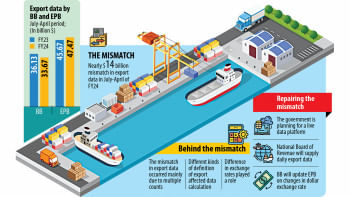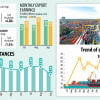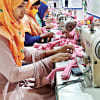Export data mismatch: Is it the tip of the iceberg?

Accurate data is a crucial input for taking effective policies and putting the economy on the right track. If the data is not correct or time-befitting, policies might be proved wrong. Then, development successes will be only on paper and will not reflect reality.
In Bangladesh, economists expressed their doubts about figures related to various economic indicators in the past and recommended the authorities correct them to ensure data accuracy and reliability, but their calls have remained unaddressed.
For example, over the years, questions were raised about the actual volume of default loans in the banking sector, production, demand and supply of major crops such as paddy, potato and onions, as well as the supply and demand of imported commodities. Timely data collection and their release were also an issue.
In recent years, exporters and observers have said that export data was inflated and did not portray the struggle entrepreneurs and industrialists had been experiencing in keeping their factories up and running, retaining global clients and preventing the cost from skyrocketing.
Therefore, whenever state-run Export Promotion Bureau (EPB) reported higher-than-usual earnings from the external sector, industry people and manufacturers raised their eyebrows. However, none paid heed to them.
The government did not take any steps to revisit the data calculation. Rather, the exporters who raised questions have allegedly faced harassment.
Finally, when the Bangladesh Bank published the corrected export data as part of its balance of payments (BoP) and detected around a $14 billion gap between national shipments and the actual receipts, it showed the extent to which data miscalculation can lead a country.
The scale of mismatch can take its toll on the economy since the size of the economy and per capita income might not glitter like it did in the past. The credibility of all government data will come under question.
The policies that were taken based on the inaccurate piece of information will lose their efficacy. For example, the $110-billion shipment goal by the next two years has to be reset in line with new realities.
A similar story might unfold if real figures on non-performing loans (NPLs) are disclosed.
Default loans in the banking sector hit an all-time high of Tk 182,295 crore in March. Industry insiders said the volume is higher than the official figure.
In 2019, the International Monetary Fund also said the actual size of bad loans is more than double the officially recognised figure. Since then, the health of the banking sector has kept worsening.
This means if the real data on bad debts, gross domestic product (GDP), per capita income, and production comes to light, it may even change the development narrative of the country.
This is because in the calculation of GDP, net export earnings are included. As the value-addition of the export is around 60 percent, the GDP size will be impacted by around $8 billion if the adjustment is made.
The government has long been trying to turn the negative financial account into a positive one since it reflects the precarious foreign currency reserve position. Whatever steps it has taken to reverse the course of the key component of the BoP have not apparently yielded the expected outcomes.
Now, with the export data correction, the financial account has returned to the black.
Policymakers often claim that Bangladesh has achieved food autarky. Yet, the country sometimes needs to import foodstuff.
The miscalculation might lead Bangladesh to a challenging situation after the graduation of the nation from the group of least-developed countries (LDCs).
Exporters have not been able to lift their share significantly in the global market despite enjoying duty benefits. They will come across intense competition since trade benefits will not be readily available in many markets once the country makes the transition.
Now, the finance ministry should probe why and how the wrong data presentation went on year after year and what its impact was nationwide.
The export earnings data mismatch should ring alarm bells for the government since it highlights the inefficiency of the country's data management system and data governance.
The government should take this issue seriously and ensure data governance to make evidence-based decisions and help the country tap its true potential. However, if it is considered as an isolated incidence, unprecedented suffering might await us.

 For all latest news, follow The Daily Star's Google News channel.
For all latest news, follow The Daily Star's Google News channel. 









Comments